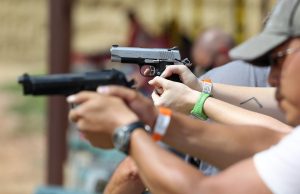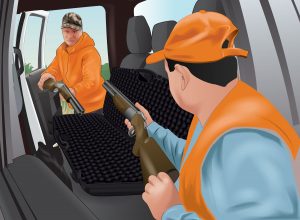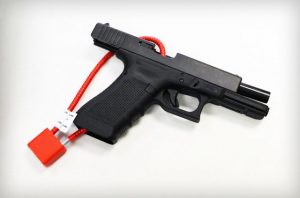There was an incident in our area recently where someone at a range narrowly missed hitting their instructor with an accidental shot from their handgun. That’s how it was reported. The shot was unintentional for sure, but accidental maybe not so much.
It turns out that the shooter wasn’t even all that new. More distracted than anything else. Apparently he still had his finger on the trigger, even though he wasn’t actively shooting, and then turned all the way around to respond to some feedback from the range staff. The weapon discharged, and luckily no one was harmed (aside from having to change their underwear right away). The point here is that the cause of the situation was more due to negligence than it was purely accidental.
on the trigger, even though he wasn’t actively shooting, and then turned all the way around to respond to some feedback from the range staff. The weapon discharged, and luckily no one was harmed (aside from having to change their underwear right away). The point here is that the cause of the situation was more due to negligence than it was purely accidental.
Technically, an accident is really something that is beyond your control and can’t be helped. Like being blindsided in a car wreck or being hit by lighting or falling space debris. Unfortunate yes, but not a lot that you could have done to prevent these types of things. Where negligence comes into play is where there is a level of culpable carelessness or neglect that contributed to the outcome. In essence, there was something that could have been done to prevent the damage or injury.
 Now you might say “What’s the point here?”. No matter what you want to call them, these types of unfortunate (and sometimes tragic) incidents are what they are and the semantics don’t really matter. Well, there is a difference that needs to be recognized. It’s not so much about laying blame, as it is trying to create a sense of responsibility and accountability for those that should know better. When someone says “It was an accident”, it really tends to whitewash the root causes and shifts the focus to the resulting injury or fatality. Think of most any household, industrial or recreational accident and there is likely a ‘could have’ or ‘should have’ that may have made a difference.
Now you might say “What’s the point here?”. No matter what you want to call them, these types of unfortunate (and sometimes tragic) incidents are what they are and the semantics don’t really matter. Well, there is a difference that needs to be recognized. It’s not so much about laying blame, as it is trying to create a sense of responsibility and accountability for those that should know better. When someone says “It was an accident”, it really tends to whitewash the root causes and shifts the focus to the resulting injury or fatality. Think of most any household, industrial or recreational accident and there is likely a ‘could have’ or ‘should have’ that may have made a difference.
So what about shooting?
Responsible gun owners may never even get close to experiencing an unintentional discharge with their weapons. Why? Because they’re normally diligent and careful. A surprised or confused exclamation of “the gun just went off” isn’t likely in their vocabulary. That’s not to say that something bad can’t ever happen to an experienced shooter, but the chances are less. Sometimes being too familiar with weapons handling can lead to complacency or poor practices.
When you look at the statistics of negligent discharges, there are a high percentage of incidents related to unauthorized  access to a weapon, ending in an individual being injured or killed. These are obviously horrible situations, and many of them could have been avoided. If a child finds a loaded handgun in Mom’s purse, a vehicle glove box or a bedside table and shoots a friend or sibling, is that an accident? If a group of young adults were ‘just messing around’ with a gun and it discharges and hits someone, is that an accident? The same can be said for any variety of scenarios where a loaded weapon is being cleaned, pointed at another person out of inexperience or forgetfulness, stored or handled improperly etc. – and the list goes on. Do you blame the gun or the ammo? That doesn’t really hold water. It basically comes down to one, or a combination of several factors:
access to a weapon, ending in an individual being injured or killed. These are obviously horrible situations, and many of them could have been avoided. If a child finds a loaded handgun in Mom’s purse, a vehicle glove box or a bedside table and shoots a friend or sibling, is that an accident? If a group of young adults were ‘just messing around’ with a gun and it discharges and hits someone, is that an accident? The same can be said for any variety of scenarios where a loaded weapon is being cleaned, pointed at another person out of inexperience or forgetfulness, stored or handled improperly etc. – and the list goes on. Do you blame the gun or the ammo? That doesn’t really hold water. It basically comes down to one, or a combination of several factors:
Insufficient storage and safety practices
Poor weapon handling habits
A lack of training and/or supervision
A basic misunderstanding, especially with novices, of how firearms work and the inherent danger that they can potentially present. We all see a lot of gunplay in movies and TV, and this can lead to a cavalier attitude toward how weapons are handled.
There are many well-communicated rules around firearm safety and storage, and it may be a little daunting for new shooters to remember everything. There are a few boiled-down fundamentals however that can go a long way in helping to keep everyone safe.
to keep everyone safe.
- Do not allow access to firearms to any unauthorized person – ever. Always store them safely and securely when not in use.
- Always assume that a weapon is loaded and handle it accordingly. A visual inspection for chambered rounds is also a basic practice that should absolutely be followed.
- Never point the muzzle of the gun at anything that you aren’t willing to shoot. It must ALWAYS be aimed in a safe direction until you are ready to acquire your target.
- Keep your finger off the trigger until you are ready to fire. Disregarding this one rule accounts for a high number of accidental discharges annually.
- Be aware of exactly what is in and beyond your line of fire. You never know what may be in the path of an errant shot.
Again, a shooting accident in the home, at the range or while hunting is sometimes not exactly that. Let’s call it what it is and make every effort to eliminate risk and hold ourselves accountable. Firearms education, communication and common sense are key to promoting safety.
Sign up for K-Var’s weekly newsletter and discounts here.

My range is an empty desert. I’m a recluse. I go to the range by myself and I come home by myself. I do stuff my way on my range and nobody is likely to walk up behind and distract me. If they do, I’ll prolly still come back alone…..
I shoot a lot.
Even in this modern time of high ammo prices.
I go by myself fairly often.
It is more enjoyable when you’re out there with your shooting buddies.
Living in PHX AZ it’s just too hot during the summer. Having learned the lessons of the past ammo is not an issue. End of October I start doing evenings and night shoots. But I’m gonna keeping to myself pretty much from here on out. All the fun of shooting. None of the drama that comes with human interaction. The notion has really grown on me the past several years.